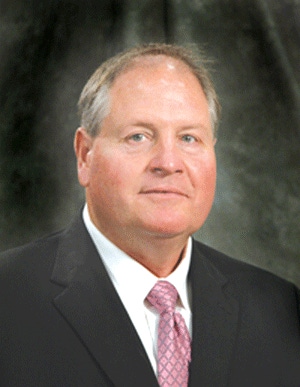
Randy Knight, a third generation dairy farmer at Pelahatchie, Miss., has been elected president of the Mississippi Farm Bureau Federation, succeeding 14-year veteran David Waide, who is retiring at the end of December.
Knight, 48, served a three-year term as president of the Rankin County Farm Bureau, served on the Mississippi Farm Bureau Federation’s board of directors for two years, and is currently serving his fourth year as the organization’s central Mississippi vice president.
He is a graduate of Hinds Junior College with a degree in farm management, and attended Mississippi State University, where he studied dairy science. In addition to his dairy operation, he has 400 head of stocker calves and manages several hundred acres of pasture and timberland.
Knight is continuing a farming tradition begun by his grandfather in the early 1900s.
“He established the dairy in 1932,” Knight says. “At that time, dairymen were milking by hand. Our operation was unique in that people from town would come out, milk a cow, and take the milk home with them.”
The dairy purchased its first milking machine in the early 1950s and Knight and his father, Lee, constructed a second flat barn and a milking parlor in 1974. Today, the dairy uses the latest technology, including computer feeders.
Computerized feeders offer advantages
“The computerized feeders save a lot of labor and they are more economical,” he says. “We try to stay up on the latest equipment in order to farm more efficiently.”
Despite a precipitous decline in the number of Mississippi dairies, including a number that went out of business in the aftermath of Hurricane Katrina, Knight says he loves the business and plans to keep at it as long as possible.
“Dairy farms that survive in these difficult times will be the forage-based operations,” he says. “Our dairy depends on ryegrass in the winter and summer grasses like fescue and bermudagrass. We summer graze and put up our own hay for the winter.”
Knight proudly says, “We’ve never been in debt, and that also helps. We don’t buy equipment unless we can afford to pay for it.”
He says Farm Bureau gives farmers “a stronger voice on issues that matter” and has been a help to them in difficult times.
“Farm Bureau is our best voice in agriculture. Since farmers numbers in the U.S. have slipped to only 2 percent of the population, it’s more important than ever that we work together to insure that our collective voices are heard.”
Work already under way on the 2012 farm bill, animal welfare issues, and the nation’s dwindling farm numbers are just a few of the many challenges that concern the farming community, Knight says.
Expanded communications effort
In his role as president, he says, “I’m going to emphasize our Ag in the Classroom Program — we must reach our children at an early age with agriculture’s story. I also want to strengthen our Young Farmers and Ranchers program because today’s young adults are tomorrow’s agricultural leaders. I will continue to support our Farmers of Mississippi ag media campaign because it has proven to be an effective means of educating consumers about agriculture.”
“I am optimistic about the future of farming, but we can’t rest,” Knight says. “We must continue to work together, with an open line of communication between county leaders, state officers and MFBF staff, to insure that our organization remains strong and represents the interests of all Mississippi farmers for many years to come.”
Knight is a member of Dairy Farmers of America and the Mississippi Cattleman’s Association. He serves on the boards of Grazing Land Management for the Natural Resource Conservation Service, the Southeastern United Dairy Association, and the Neshoba County Gin Association. He is an active member of the Shiloh United Methodist Church, and he and his wife, Mary, have two daughters.
About the Author(s)
You May Also Like




